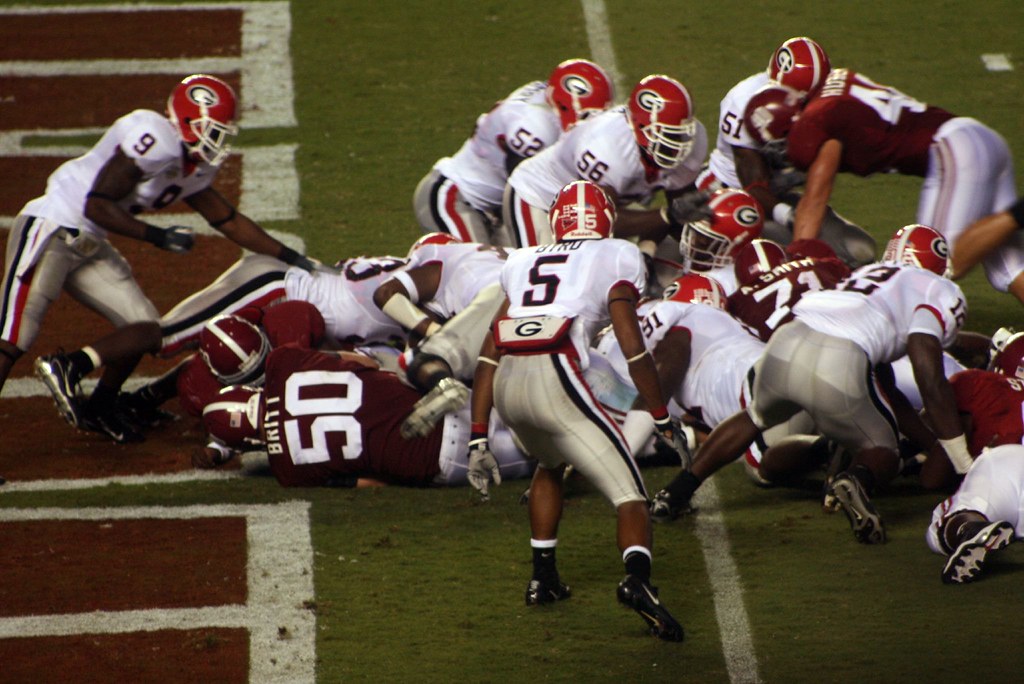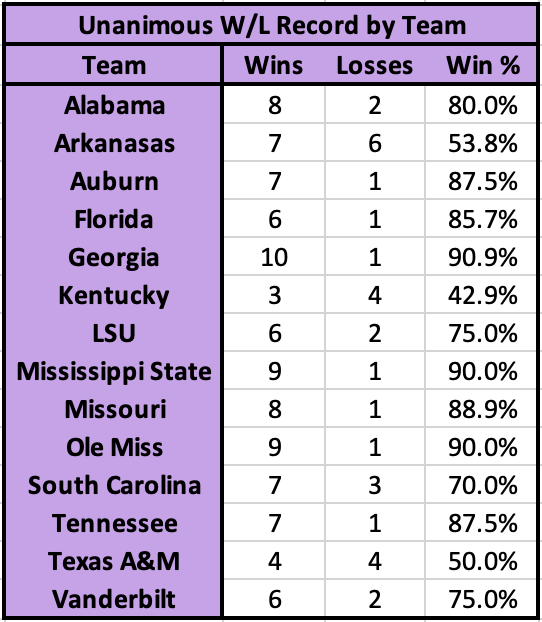|
It's been nearly a week since the Georgia Bulldogs dismantled the TCU Horned Frogs in this year's National Championship game, and we now have to suffer through the seven or so months of misery until college football returns in late August. The 2022 BSSR SEC Betting Challenge was a little different this season, as we retired the challenge following the penultimate week of the regular season after our hearts were crushed by Tennessee's massive upset loss at South Carolina. I wrote an article to explain our decision to conclude prematurely where I showed the final scoreboard and declared myself the winner by default, but it turned into a soliloquy on the suffering that Tennessee athletics have induced upon my life. That article can be read here if you missed it: https://www.bucketsquadsportsreports.com/betting/ncaaf-sec-bets-season-finale After taking a few weeks to recover from my sorrow, I began the process of analyzing our collective performance in the bets we gave out for the 2022 SEC football season. I've conducted this analysis in each of our first two season doing the challenge, but I dug a little bit deeper this year to discover some more interesting data points which I will be sharing below. If you missed it, here was the final scoreboard of our individual performances, which was only missing the nine games of Week 13 and the SEC Championship Game: While I am proud to accept the fame and glory that come with winning the BSSR SEC Betting Challenge, the more significant aspect of my victory is that I prevented Jacob from three-peating as the only champion in BSSR history. Bucket Squad Sports Reports (Your #1 Source for All Things Sports) is an Equal Opportunity Employer and loves seeing diversity among the ranks of its champions. Now to get into how we fared as a unit across the 12 weeks we handed out our picks. As I did after the last two seasons, I ran a basic analysis on our picks to try to determine any noticeable trends in our collective effort to provide the most accurate betting advice we could. Just like in past seasons, I judged our success by the win percentage of bets that we all or mostly agreed upon. There are three types of bets:
There are three classifications of bet predictions:
For each type of bet, I figured out which classification it fell into based on how many of us picked it. Then, after every bet placed fell into one of the three classifications, I sorted them by type of bet to determine how many times we correctly picked a game right that we agreed upon versus how many times we were incorrect in those scenarios. Here are the results represented as win/loss records, and also compared to our results from 2020 and 2021: The cells shaded green mean we improved as a group from year to year, while the red cells mean we did worse this season than we did the season before. Here are the results represented as win percentages, which is what I used to indicate the improvements/detriments: While we have unfortunately taken slight step back in all three bet types as a whole, the good news is that we got better in both money line and point total bets when we all decided unanimously. Our win percentage isn't good at all in unanimous picks against the spread, but there was a relatively small sample size of instances when we all agreed on a team to cover. I should also note that Alex was intentionally picking against Tennessee for most of the season to avoid jinxing them with his bad luck, which took away some potential unanimous wins for us given how good the Vols played this season. (But it also fully proves that Alex's efforts helped, and we are all thankful to him for that.) Additionally, there was at least one week where Jacob picked the favorite and over in every game without even seriously considering his picks. Has saboteruical ways definitely tanked our final statistics, which is frustrating to say the least. This year, I also researched our week-to-week performances to judge which weeks we performed best and worst. Surprisingly, our top weeks came early in the season in Weeks 1 and 3, where we collectively hit at 75.0 percent and 74.1 percent, respectively. My hypothesis is that those games were slightly easier to pick as most SEC teams were facing off against inferior non-conference opponents. Our unanimous picks for the money line were undefeated in both of those weeks as evidence for that claim. Our worst week was in Week 9 and consisted of just four matchups. We were 4-8 as a group in that week for a 33.3 percent hit rate, our lowest of the season and the only week that fell below .500. That week featured upsets from LSU and South Carolina over Ole Miss and Texas A&M, respectively, as well as a surprisingly low-scoring game in which Vanderbilt kept it close with Missouri. I've been talking a lot about our unanimous picks, which leads me to introducing a new graphic that shows how our unanimous bets fared in games involving each team in the conference. I was interested if there were any teams we picked better than others, and it's safe to say there were a couple standouts. The above records only include bets of all types that the five of us all picked for any given game involving each of the 14 teams in the SEC. It's worth noting that the majority of bets that fell into the unanimous category were money line picks, but there were still a few bets against the spread and point total that we all agreed upon as well. Our best record came when betting together on games involving Georgia at 10-1, which is unsurprising given how we all picked them to win in almost every game they played this season. Following the Bulldogs are Mississippi State, Ole Miss, Missouri, Auburn, and Tennessee, all of which provided positive win percentages of 87.5 percent or higher. On the other end of the spectrum falls Kentucky, which at 3-4 was the only team that we picked incorrectly as a group more often than not. The Wildcats were so inconsistent and tanked so heavily as the season progressed that it was difficult to protect what to expect of them each week. Texas A&M and Arkansas fell into a similar category over the course of the season and were equally as difficult to predict, which is why they were the two teams following Kentucky in our list of failure. Finally, here are our total records after three years of picking SEC games: And here are the same records represented as percentages: For both charts, the green cells simply represent a positive record or win percentage exceeding 50 percent, while the red cells are records or win percentages below 50 percent.
Last season's two-year totals ended at 77.4 percent for the money line, 53.9 percent against the spread, and 49.4 percent on the over/under. So while we've dipped just a bit when adding year three's figures for the money line and spread, we've finally gotten our point total bets above the 50 percent mark and into the green. This college football season was fun to watch and it's always enjoyable for the five of us to have a weekly competition with pride on the line as we tune into each Saturday's slate of SEC games. As always, we will continue to do our best to provide the most accurate sports betting predictions on the internet when SEC football returns next season. In the meantime, follow along with the NFL picks I'll be giving out for each week of the playoffs and in March, be sure to join the second annual Bucket Squad Sports Reports (Your #1 Source for All Things Sports) Mega March Madness Matchup Monstrosity to enter an NCAA Tournament bracket for free for a chance to win $100. My goal for 2023 is to expand the BSSR's written content next fall when football returns, which will include my annual quest to beg our lead college football expert, Alex Hill, to give his thoughts and picks on all things college football for us. Until then, enjoy the NFL postseason, college basketball, and the NBA, and the five of us will be back when the SEC kicks off to begin our fourth annual SEC Betting Challenge. Written by Nick Swatson
0 Comments
Leave a Reply. |







